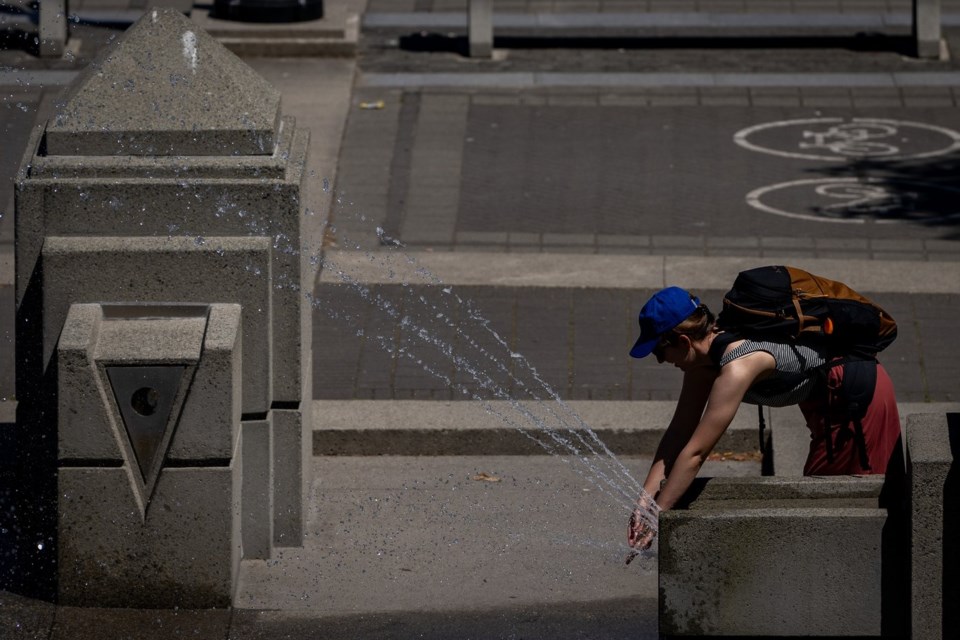VANCOUVER — A heat wave has settled in, bringing scorching temperatures across more than 40 regions in British Columbia.
But, the extreme heat — and a warning from Environment Canada — isn't deterring some beachgoers and outdoor enthusiasts in Vancouver.
Among them is cyclist Anthony Maw, who stopped on the seawall at Kitsilano Beach to buy some lemonade from two 12-year-old girls who were taking advantage of the high temperatures to make some extra pocket money.
"I don't mind supporting local," he joked in an interview.
Maw said he had started his cycle near the city's Queen Elizabeth Park and planned to bike along the city's seawall to Spanish Banks Beach.
"The water actually moderates the temperature quite a bit," he said, explaining why he decided to stay on the path that runs along the shoreline.
He had stopped about halfway through his ride to rehydrate with a glass of lemonade, but said he was enjoying the heat.
"This is the best time of year to be in Vancouver and, honestly, to be alive. Six months from now you'll be wishing for the heat again," Maw said with a laugh.
The heat warnings cover much of the lower third of the province, the northeastern part of B.C., inland sections of the central and north coasts, as well as east and inland Vancouver Island.
Most regions of the province are expected to see temperatures above 30 degrees Celsius, while the southern Interior may see temperatures that push into the low 40s this week.
The weather office initially issued about two dozen warnings but expanded — and nearly doubled them — by Sunday.
Among them was Metro Vancouver, which is expected to have daytime temperatures reaching up to the mid-30s inland, and the high 20s near the water.
Environment Canada said elevated temperatures pose a risk to public health, so it encouraged to take precautions to minimize exposure.
Beachgoer Sarah Adair said she and her friends had initially planned to spend the afternoon on the sand at Kitsilano Beach.
"I wish I had a beach umbrella," she said in an interview.
"We were probably on the beach for about 20 minutes and it got pretty insufferable in the heat."
So, Adair said they quickly relocated to a nearby patch of grass where they were shaded by a tree. She noted they were also staying hydrated by drinking lots of water and avoiding alcohol.
The City of Vancouver said in a news release Saturday that it had opened cooling centres in libraries and community centres, and reminded residents of the more than 200 permanent water fountains that are freely available for use across the city.
The city also asked residents to check on vulnerable people, including seniors, people who live alone, those who have pre-existing health conditions or mental illness including substance-use disorders, as well as those who are experiencing homelessness or have limited mobility.
"Guidance from health partners indicates that it may be unsafe for some people at greater risk of heat illness to spend time in indoor temperatures above 26 degrees Celsius," the release said. "The risk may increase significantly when indoor temperatures are above 31 degrees Celsius."
Vancouver local Jill Sartore, who was also sitting in the shade on a patch of grass in the Kitsilano neighbourhood, said she was avoiding the sun after braving the heat at a street festival on Saturday.
"I think yesterday felt hotter because we were on pavement, but today we're just sitting in the shade (and) I love it," she said enthusiastically. "But I have a rooftop and I can't be on it today. It's too hot."
She said she is concerned about what the heat may mean for wildfires in the province.
"If there's no rain, are we gonna start burning down? That's a little worrisome," she said.
The BC Wildfire Service said in its situation report on Sunday that the "well above seasonal temperatures" were expected to persist into the week.
"This warming, drying trend will continue to increase the potential for elevated wildfire activity," it said.
But, it noted, the weather lowers the risk of lightning that can spark blazes.
Of the nearly 100 active wildfires burning in the province as of Sunday, it is reporting that 78 per cent of them were started by lightning and 22 per cent were human-caused.
This report by The Canadian Press was first published July 7, 2024.
The Canadian Press




